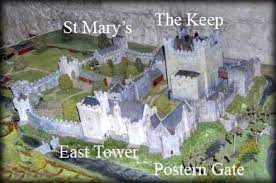23 March 1535: Sir William Skeffington captured Maynooth Castle on this day. He had been sent over from England the year before by Henry VIII to re- impose Royal rule upon the Irish and the Anglo-Irish Lords, specifically the family of the Earl of Kildare. He was faced with a military revolt by Lord Thomas Fitzgerald, the son of the Earl of Kildare the great Garrett ‘Oge’ Fitzgerald, who was held captive in the Tower of London.
Lord Thomas or ‘Silken Thomas’ was a rash and impetuous youth who badly misjudged his own power and abilities. On hearing [falsely] that his father had been executed he rose in revolt and attcked the English wherever he could find them. Through the power of his family’s name and the desire of the Catholics of Ireland to pre-empt the imposition of the English Reformation upon Ireland this led to a flush of initial success that rapidly petered out at the end of 1534.
Skeffington had remained inactive during the whole winter, gathering men and supplies. But in March 1535 he laid siege to the castle of Maynooth, the strongest of Fitzgerald's fortresses, which was defended by 100 men, mostly gunners.
Sir William Skeffington remained inactive during the whole winter. But in March 1535 he laid siege to the castle of Maynooth, the strongest of Fitzgerald's fortresses, which was defended by 100 men. After a siege of nine days, during which the castle was battered by artillery, then for the first time used in Ireland, he took it by storm, except the great keep; and the garrison who defended this, now reduced to thirty-seven men, seeing the case hopeless, surrendered, doubtless expecting mercy.
A Concise History of Ireland by P. W. Joyce
Though artillery had been played upon the walls the outer defenses were actually stormed through the use of treachery. The Constable of the Castle was one Christopher Paris who betrayed the entrance to the structure by rendering the men charged with the defense of the entrance either drunk or more probably he spiked their drinks to render them senseless. As the English flowed in they put most of the garrison to the sword. The attackers lost some seven dead to about sixty defenders so it looks like they caught them unawares in their slumbers. Only the great keep remained untaken and the survivors there [some 30 men] struck on terms that their lives would be spared if they would but come out and lay down their weapons.
In the aftermath Skeffington wrote to King Henry:
Their lives were preserved by appointment, until they should be presented to me, your deputy, and then to be ordered, as I and your council thought good. We thought it expedient to put them to execution as an example to others (Carew Papers). Local tradition holds that they were hanged from the central arch of the castle.
The Neighbourhood of Dublin By Weston St. John Joyce
However the Lord Deputy’s ruthlessness backfired on his successors, as his actions only made future defenders more wary of such capitulations and ‘the Pardon of Maynooth’ became a byword for treachery amongst the Irish.
As for the man who betrayed his foster brother’s Castle he made it out alive but was seized and brought before the Lord Deputy:
Murder and foul treachery was done by his own gallowglas and trusted constable on the son of the Earl of Kildare and his town, namely, Magh-nuadhad, was sold and betrayed by him to the Saxons, whilst the warders of the town were asleep and the majority of the warders were slain in their sleep and five, or six, clerics and priests were slain there. And, when they went into possession of the town, they brought that man who betrayed the town to them, into the presence of the Deputy of the king. And it was asked of him how long he could hold the town, if he had not betrayed it. And he said that he could hold it to the end of a year.
Skeffington was not impressed with this man who was not only a Rebel in his eyes but a traitor to his own side as well. He had him put to death and his body chopped to pieces.
And this is the sentence that was passed upon him,—everything that was promised to him, to give it to his father, for he did not treachery or deception, and the man that did the deceit and the foul treachery on his lord, to be put to death, on the plea that he would do more of that misdeed upon them, or on someone else. And four quarters were made of him. And woe is he that would do treachery, or parricide, or deception, to doom, as God deigned to have that deception issue, like that. And benison to the man that passed that sentence.
The Annals of Ulster 1535 AD


No comments:
Post a Comment